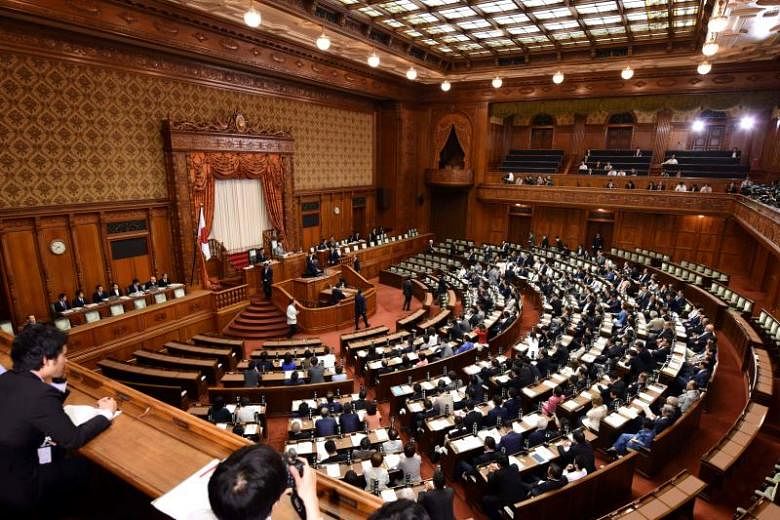FUKUOKA - Japan on Thursday (June 15) enacted a law that preemptively punishes the organised planning of 277 different crimes from terrorism, drug trafficking, to copyright violation, despite mounting concerns over civil liberties.
This is Tokyo's fourth attempt to pass the contentious Bill, which in its previous iterations covered as many as 600 offences and had been dubbed the "conspiracy Bill".
It effectively upends Japan's criminal law system, in which charges can only be brought upon a suspect after a crime has been committed.
Concerns have mounted both domestically and globally over the scope of the law and how it could have a chilling effect on civil liberties, despite the government's repeated reassurances that the law will target terrorist groups and organised crime,
The opposition had sought to stonewall the passage of the Bill through a series of no-confidence motions, warning that its broad scope will allow Tokyo to significantly expand surveillance on ordinary citizens.
Prime Minister Shinzo Abe has framed the law as necessary to prevent attacks as Tokyo hosts the Olympic and Paralympic Games sporting event in 2020, when Japan expects to welcome a record 40 million visitors.
"That's why the law was enacted."
Opposition Democratic Party leader Renho, who goes by one name, in a statement blasted the ruling party tactics and termed the law "brutal" legislation that violated freedom of thought.
The opposition, which tabled a no-confidence motion against Mr Abe's Cabinet late Wednesday night in an attempt to thwart the passage of the Bill, said not enough time has been spent to deliberate the Bill.
Under the new law charges can be brought is there is evidence of specific planning efforts, such as the surveying of a location. The law also has provisions to reduce penalties to those who confess before a crime is committed.
All members of a group involved in conspiring to commit a crime will be held responsible, if it was determined that at least one of them is involved in preparations.
Those conspiring to commit a serious crime will face a prison term of up to five years, while those planning lesser crimes will face up to two years in jail.
The ruling Liberal Democratic Party (LDP) has firm control over both the lower and upper chambers of the Diet, which collectively have discussed the Bill for under 50 hours.
Even so, the LDP's decision to bypass a bipartisan Upper House committee to force the Bill to a vote comes as an extremely rare strongarm tactic, local media reports have said.
The opposition, led by the Democratic Party (DP), accuses the LDP of wanting to close the Diet session early so that Mr Abe can "avoid uncomfortable questions" over a simmering political scandal in which he is alleged to have granted favours to a close friend.
The Bill has sparked small-scale protests across Japan. A Kyodo news agency survey last month showed voters are split over the Bill, with support at 39.9 per cent and opposition at 41.4 per cent.
Legal experts and rights groups have also expressed concern of the law's overreach in allowing Tokyo to wire-tap and monitor conversations.
They also warn that the law amounts to the LDP trying to consolidate power, and could pave the way to lesser freedoms of expression and the arbitrary punishment of civic society groups.
UN Special Rapporteur on the rights to privacy Joseph Cannataci said in a statement he had expressed his concerns over the "risks of arbitrary application" of the law.
Tokyo's top government spokesman Yoshihide Suga brushed off his claims as "utterly incorrect" and not representative of the UN. Government officials have said the passage of the Bill was a prerequisite for it to implement a United Nations treaty against Transnational Organised Crime that Japan has ratified.
United States whistle-blower Edward Snowden also told Kyodo News that the law's passage marks "the beginning of a new wave of mass surveillance in Japan".
Mr Snowden, who in 2013 had exposed the US' surveillance programmes, noted that with the focus on "everything else that's not related to terrorism ... the only real understandable answer is that this is a Bill that authorises the use of surveillance in new ways because now everyone can be a criminal".
Some have compared the Bill to Japan's "public order maintenance law" that was in place before World War II, under which people could be subject to arrest for political offences and anti-war activities.


